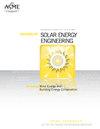Comparative Study of Different Tube Geometries of Evacuated Tube Solar Collector
IF 1.9
4区 工程技术
Q3 ENERGY & FUELS
Journal of Solar Energy Engineering-transactions of The Asme
Pub Date : 2023-02-14
DOI:10.1115/1.4056904
引用次数: 0
Abstract
This study investigates the thermal performance of an evacuated U-tube solar collector (ETSC) using different tube geometrical configurations. The effect of tube geometry on overall collector efficiency is numerically analysed and compared with experimental results. Three different ETSC configurations made of copper viz., model 1 (M1) having one inlet and two outlets, model 2 (M2) having one inlet and three outlets, and model 3 (M3) having one inlet and four outlets are considered. An overall rise in temperature of heat transfer fluid at outlets for each model is predicted and compared with conventional U-tube (CT) for different mass flow rates and solar insolation to evaluate the collector performance. In comparison with the CT, the outlet temperature of the M3 and M1 is higher by 46.2 % and 40.3% respectively. M2 gives a nearly similar fluid outlet temperature as M1. A maximum of 35.4% enhancement in heat gain compared to the CT is observed for M3 (which is best among modified configurations) under similar operating conditions. However, at 788 W/m2 solar insolation and a constant mass flowrate of 0.0167 kg/s, the estimated thermal efficiency of M1 is higher among the three models which is 33.5% higher than the CT. The experimental results closely approximate the numerical predictions with a deviation of ±1.1°C . From the economic evaluation of the modified collectors, a minimum payback period of 2.5 years was observed for model 1 which is the shortest among the investigated ETSC systems.真空管太阳能集热器不同管型的比较研究
本文研究了真空u型管太阳能集热器(ETSC)在不同几何结构下的热性能。数值分析了管的几何形状对集热器总效率的影响,并与实验结果进行了比较。三种不同的铜制ETSC配置,即模型1 (M1)有一个入口和两个出口,模型2 (M2)有一个入口和三个出口,模型3 (M3)有一个入口和四个出口。预测了每种模型的出口传热流体温度的总体上升,并将其与常规u型管(CT)在不同质量流量和太阳日照下的温度进行了比较,以评估集热器的性能。M3和M1的出口温度分别比CT高46.2%和40.3%。M2给出的流体出口温度与M1几乎相同。在类似的操作条件下,与CT相比,M3的热增益最大增加了35.4%(在改进的配置中最好)。然而,在788 W/m2的太阳辐照量和0.0167 kg/s的恒定质量流量下,M1的估算热效率在三种模型中较高,比CT高33.5%。实验结果与数值预测非常接近,误差为±1.1°C。从改进集热器的经济评价来看,模型1的最小投资回收期为2.5年,是所调查的ETSC系统中最短的。
本文章由计算机程序翻译,如有差异,请以英文原文为准。
求助全文
约1分钟内获得全文
求助全文
来源期刊
CiteScore
5.00
自引率
26.10%
发文量
98
审稿时长
6.0 months
期刊介绍:
The Journal of Solar Energy Engineering - Including Wind Energy and Building Energy Conservation - publishes research papers that contain original work of permanent interest in all areas of solar energy and energy conservation, as well as discussions of policy and regulatory issues that affect renewable energy technologies and their implementation. Papers that do not include original work, but nonetheless present quality analysis or incremental improvements to past work may be published as Technical Briefs. Review papers are accepted but should be discussed with the Editor prior to submission. The Journal also publishes a section called Solar Scenery that features photographs or graphical displays of significant new installations or research facilities.

 求助内容:
求助内容: 应助结果提醒方式:
应助结果提醒方式:


